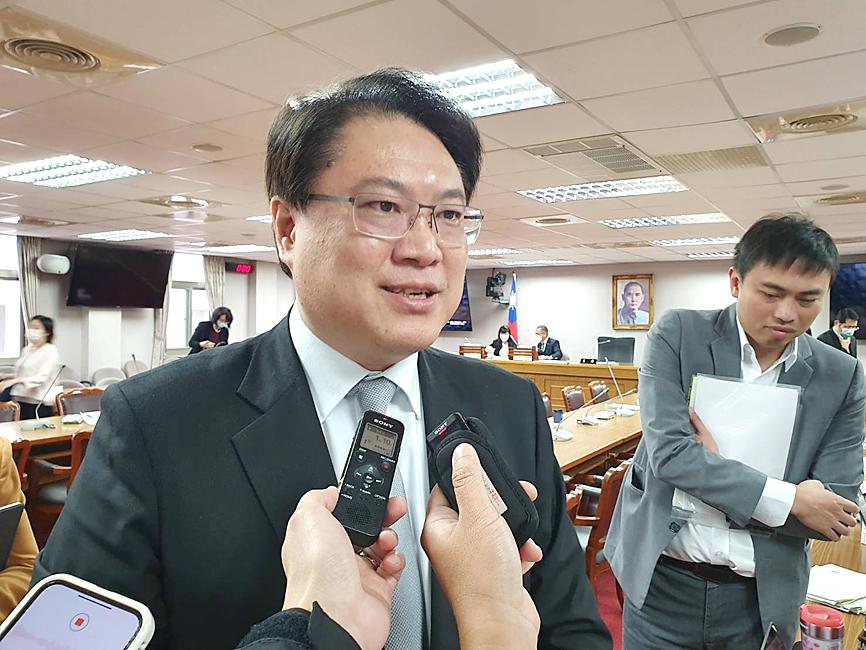Minister of the Interior Lin Yu-chang (林右昌) yesterday lauded the passage of the first reading of proposed amendments to the Organization Act of the Ministry of the Interior (MOI, 內政部組織法), calling it a significant step forward on an initiative that has been 25 years in the making.
A meeting of the legislature’s Judiciary and Organic Laws and Statutes Committee and Internal Administration Committee earlier yesterday approved a draft restructuring bill that would task the ministry with planning, promoting, overseeing and assisting with local laws and organizations, the measurement and registration of land and buildings, and other affairs.
Democratic Progressive Party Legislator Tang Hui-chen (湯蕙禎) said that a Cabinet-proposed amendment that the ministry should “plan, promote and guide” religious temples and ancestral worship guilds should be expanded to include management and oversight.

Photo: Hsieh Chun-lin, Taipei Times
Lin told the meeting that the ministry respects the autonomy of religious groups and organizations in line with the Constitution’s guarantee of religious freedom and that providing “guidance” instead of “management” would remove misconceptions about government interference in one’s faith or religion.
The Executive Yuan’s proposal also states that the ministry would have five subsidiary agencies — the National Police Agency, the National Immigration Agency, the National Fire Agency, a national land management agency and a national park agency — but legislators were unable to reach a consensus.
New Power Party Legislator Chen Jiau-hua (陳椒華) said that national park affairs should be managed by the Council of Agriculture’s Forestry Bureau, while Taiwan People’s Party Legislator Lai Hsiang-ling (賴香伶) said that a national park agency should be placed under the supervision of the Environmental Protection Administration (EPA).
Urging legislators to adopt the Executive Yuan’s version of the bill, Lin said that national park affairs are not limited to resource management, but also operations and management, which the ministry’s many agencies can help the proposed park agency with.
Aside from environmental conservation, national parks have many other functions — including regional land management — which do not fall under the purview of the forestry bureau or the EPA, Construction and Planning Agency Director-General Wu Hsin-hsiu (吳欣修) told lawmakers.
Should the amendments be promulgated into law, a national land management bureau and a national parks bureau would be set up, which would help government efforts in planning and using national land for urban development purposes, Lin said.
The joint committee also approved draft bills on organization acts for the National Fire Agency, a national land management agency and a national park agency.
Expressing his hope that the bill would be passed this legislative session, Lin said that it would need cross-party negotiations on disagreements over some of the proposals and that his ministry would continue to communicate with legislators.
Also yesterday, the legislature’s Internal Affairs Committee passed the first reading of an amendment to the Marine Pollution Control Act (海洋污染防治法).
The amendment would see the addition of a marine pollution prevention tax, the minimum amount of which has yet to be decided, as well as the establishment of a marine pollution prevention foundation.
Crude oil importers, maritime construction firms and businesses creating marine waste would all have to pay the fees, the amendment says.
The fund would source measures for preventing, cleaning and handling marine waste nationwide.
The amendment hopes to strengthen the nation’s control over the maritime environment, protect the seas and ensure the sustainable use of marine water.
Additional reporting by Hsieh Chun-lin

Taiwan is to commence mass production of the Tien Kung (天弓, “Sky Bow”) III, IV and V missiles by the second quarter of this year if the legislature approves the government’s NT$1.25 trillion (US$39.78 billion) special defense budget, an official said yesterday. Commenting on condition of anonymity, a defense official with knowledge of the matter said that the advanced systems are expected to provide crucial capabilities against ballistic and cruise missiles for the proposed “T-Dome,” an advanced, multi-layered air defense network. The Tien Kung III is an air defense missile with a maximum interception altitude of 35km. The Tien Kung IV and V

The disruption of 941 flights in and out of Taiwan due to China’s large-scale military exercises was no accident, but rather the result of a “quasi-blockade” used to simulate creating the air and sea routes needed for an amphibious landing, a military expert said. The disruptions occurred on Tuesday and lasted about 10 hours as China conducted live-fire drills in the Taiwan Strait. The Civil Aviation Administration (CAA) said the exercises affected 857 international flights and 84 domestic flights, affecting more than 100,000 travelers. Su Tzu-yun (蘇紫雲), a research fellow at the government-sponsored Institute for National Defense and Security Research, said the air

Taiwan lacks effective and cost-efficient armaments to intercept rockets, making the planned “T-Dome” interception system necessary, two experts said on Tuesday. The concerns were raised after China’s military fired two waves of rockets during live-fire drills around Taiwan on Tuesday, part of two-day exercises code-named “Justice Mission 2025.” The first wave involved 17 rockets launched at 9am from Pingtan in China’s Fujian Province, according to Lieutenant General Hsieh Jih-sheng (謝日升) of the Office of the Deputy Chief of the General Staff for Intelligence at the Ministry of National Defense. Those rockets landed 70 nautical miles (129.6km) northeast of Keelung without flying over Taiwan,

A strong continental cold air mass is to bring pollutants to Taiwan from tomorrow, the Ministry of Environment said today, as it issued an “orange” air quality alert for most of the country. All of Taiwan except for Hualien and Taitung counties is to be under an “orange” air quality alert tomorrow, indicating air quality that is unhealthy for sensitive groups. In China, areas from Shandong to Shanghai have been enveloped in haze since Saturday, the ministry said in a news release. Yesterday, hourly concentrations of PM2.5 in these areas ranged from 65 to 160 micrograms per cubic meter (mg/m³), and pollutants were